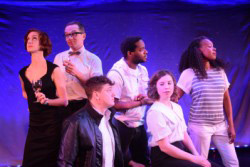Reviews
Note: Love is a Many Splintered Thing was originally called What We Do For Love. In the reviews, the newer title has been used.
“Had a great evening seeing ‘Love is a Many Splintered Thing’ …Lots of fun and memories for any age. ”
— Reagan Smith, “Smith and Riley” Radio Show – Clear Channel
. .a look at how brilliantly popular culture has been documented through the songs we made into hits. This is an energetic and lively production, with a good cast of talented singers and actors. . . . .the wave of romantic nostalgia that ‘Love Is A Many Splintered Thing’ evokes is an even better reason to attend and enjoy the show.”
—Michael Freeman, The Ledger
Writer Dorothy Marcic creates a well structured mash up of the genre, capturing the sound and feel of a time when we were all younger, and perhaps not even born yet… fluid and dynamic show… nostalgic romance coupled with a 21st century attention span.”
— Carl Gauze, Ink 19 Archikulture
The Audiences Have Spoken!
 “Great Performance! Following the story in music is easy and delightful!”
“Great Performance! Following the story in music is easy and delightful!”- “Overall a GREAT show — excellent cast and great book.”
- “Very fun night out, will definitely recommend to friends!”
- “Great show! Lots of fun!”
- “AWESOME SHOW!!!”
- “Love the song selections.”
- “All the actors and actresses were great.
- “Show was terrific!
THE LEDGER Review
Reviewer: Michael Freeman
If there’s been one constant, overriding theme in popular music since recording studios first got invented, it hasn’t been war, or social justice, but something else entirely: the never ending pursuit of love.
Decade after decade, from genres as diverse as pop to the blues, to folk, rock and country, it’s been the most universal theme in music, that eternal question of why we fall in love, who we latch onto, and how that one individual can positively captivate us. Over the years, love songs have expressed a wide range of romantic emotions: the excitement of your first great crush, the heartache of a burning love that dies, the sorrow of learning you’ve been betrayed, and the determination to pick yourself up and start all over again. Entire albums have been created of nothing more love songs, all variations on that single theme.
In her new cabaret/musical revenue “Love is a Many Splintered Thing”, playwright Dorothy Marcic uses a series of love songs, mainly top 40 hits from the 1960s, 1970s and 1980s, to chart the changing nature of romance, from the initial thrill of first falling for that special someone, to the complex mixture of anxiety and exhilaration when you’re ready to settle down into marriage, to the sting of realizing the love has faded.
Marcic created a similar show called “Respect,” which used songs from different eras to create a kind of musical map demonstrating the changing role women have played in American society.
“Love is a Many Splintered Thing” operates on a more universal tapestry, connected not by how attitudes have changed over succeeding years, but rather how popular love songs have done a remarkable job of portraying specific moods, feelings and attitudes about the never-ending hunt for a suitable mate — to the point where the lyrics of those catchy, finger snapping hits create a story about how three couples find love, then sorrow, and perhaps a glimmer of hope once again.
The first act in this three act show looks at six high school students experiencing their first starry-eyed crush, not to mention more than a touch of burning passion at times – but at the same time learning ways to manipulate the object of their desire to get exactly what they want out of the relationship. Throughout the play, Marcic tells her story entirely through the songs, demonstrating that pop hits common to any radio listener may have beguiling beats, but also some rather insightful lyrics about the strange things that make our hearts tick.
Some of the songs come from the same songwriter, but express different emotions: early on, the three men share the elation of seeing a fresh face and knowing that’s it, they had found their one and only, through Neil Diamond’s “I’m A Believer” (“I thought love was only true in fairy tales, then for someone else but not for me -. Then I saw her face — now I’m a believer”). Much later, Marcic returns to Diamond when one couple’s marriage turns sour and they lament to one another, “You Don’t Bring Me Flowers” (“You hardly talk to me anymore when I come through the door at the end of the day”).
By the end of the second act, dubbed “Honeymoon’s Over,” Marcic has tapped into virtually every romantic sentiment imaginable: rejection, lust, manipulation, and even the amazing discovery that once a passion for a loved one starts to fade, it can be re-ignited — a development you might never have imagined was possible.
“Love is a Many Splintered Thing” is less of a straight forward narrative than a look at how brilliantly popular culture has been documented through the songs we made into hits. Musicians and songwriters have done a much better job than you’d think of painting a picture of how men and women relate to — and often savage — one another in an effort to find the glory of love.
“Love is a Many Splintered Thing” is not only fun to watch because of the talented performers, or because of those memorable songs. Chances are few if any member of the audience won’t stop at some point during the show, and smile at the recognition that yes, you were there once, experiencing those exact same emotions and reactions. The wave of romantic nostalgia that “What We Do For Love?” evokes is an even better reason to attend and enjoy the show.
Theater Review: ‘Love’ at The Pines
Wednesday, March 28, 2018 by CAROLE GORNEY Special to The Press in Focus

CONTRIBUTED PHOTO BY THE PINES DINNER THEATRE The Pines Dinner Theatre “Love is a Many Splintered Thing” cast, from left, front row, Patrick Davis (Bill) and Lisa Sims (Hope), and, back row, Meg Stefanowicz (Desiree Sue), Ken Quiricone (Yale), Kyle A. Jack (Sean), and Ashely Perkins (Roberta).
“They say that breaking up is hard to do,” but not when it’s done to music in the Pines Dinner Theater production of “Love is a Many Splintered Thing.”
Packed with four decades of Top-40 hit songs from Neil Diamond and Cher to Elton John and Gloria Estefan, not a word was spoken by the cast the entire evening. Instead, the story of six friends and their romantic relationships from high school to adulthood is told entirely through the lyrics they sing.
The engaging plot was created by Dorothy Maric, playwright of “Respect,” a similar type of musical that examines women’s role in American popular music. “Love is a Many Splintered Thing” is remarkable for its ability to blend the lyrics of literally dozens of songs from different eras into a meaningful storyline. The music arrangements are by Hinton Battle,
The daunting task of telling that story entirely through song fell on The Pine’s cast of three male and three female actor-singers, who are the first to perform the musical on stage in its Lehigh Valley premiere. Until The Pines’ production, the show was presented in workshops and readings.
During the Feb. 23 performance, seen for this review, the ensemble of spirited players kept the pace going from the openers “Love is in the Air” and “The Look of Love,” through the pains of break up with “She’s Out of My Life,” and back to “Love is in the Air.”
Ken Quiricone was perfect at portraying the many facets of the shy nerdy Yale, showing him as a sympathetic character suffering from unrequited love (“I think I Love You,”), while also ably projecting a humorous side. Quiricone had one of the best controlled singing voices in the ensemble.
The sweet-talking, marriage-shy Bill was ably played by Patrick Voss Davis, who has a wonderfully strong singing voice. Among his best numbers were “The Wanderer” and “Baby Don’t Get Hooked on Me.”
Together with Kyle A. Jack as Sean, the loyal friend who marries his true love (“Ain’t Nothin’ Like the Real Thing, Baby”), the guys were great singing together (“Did You Ever Have to Make Up Your Mind”).
The love object of Yale and Bill is Hope, played by Lisa Sims. She has a lovely voice, showcased well in “Wedding Bell Blues” and “You Don’t Bring Me Flowers.” Ashley Perkins was very personable as Roberta, Sean’s wife, with a powerful voice to match. She was memorable singing her warning to Hope (“Don’t Fall in Love with a Dreamer”).
Meg Stefanowicz has a nice stage presence and her portrayal of the seductress Desiree is first-rate.
Director Oliver Blatt’s black and white costuming that varies in patterns from scene to scene was impressive. He provided a colorful surprise in the last scene.
As always, Stacy Bechtel did an amazing job as music director, sound mixer and multi-instrumentalist.

